 This weekend another 48-Hour Film Project kicks off, this time in Atlanta. While the deadline to sign up for the competition has passed, you can see the results of this coming weekend's hard labor during mid-week screenings at the Landmark Midtown Art Cinema (the same location where the Atlanta Film Festival is held each year). Screenings begin July 1st at 7 p.m. and resume on the 2nd and 3rd, also at 7 p.m.
This weekend another 48-Hour Film Project kicks off, this time in Atlanta. While the deadline to sign up for the competition has passed, you can see the results of this coming weekend's hard labor during mid-week screenings at the Landmark Midtown Art Cinema (the same location where the Atlanta Film Festival is held each year). Screenings begin July 1st at 7 p.m. and resume on the 2nd and 3rd, also at 7 p.m.
The winning team from Atlanta will be invited to attend the Filmapalooza Awards weekend, and will go on to compete in second round competitions. The winning 48 Hour film of 2008 is expected to be screened at the Cannes Film Festival.
There's no guarantee that all of these films will be good, but if you're looking for the indie-est of the indie films in Atlanta, the 48-Hour Film Project is definitely the place to be this week.
Don't forget to check out the other cities on the 2008 tour -- your chance to shine as a 48-hour filmmaker may be coming soon!
I've long been an advocate of short filmmaking competitions. Even more so than local film festivals, such competitions encourage an interest in filmmaking where traditionally little has existed. 48-Hour is certainly the most prominent example of the form, but newer efforts like Filmmaking Frenzy and Rapid i Movement give hope to the idea that short form filmmaking is the dominion of more than just film school students and web cam dancers.
Not that there's anything wrong with that.
| You
are viewing the old version of the Film Festival Secrets blog. Please
visit the new site and sign up for the newsletter with exclusive content. |
48-Hour Film Project: Atlanta 2008 Screenings this coming week
Couch Fest wants your butt to visit new, exotic sofas
 In late September Craig Downing will unveil the inaugural Couch Fest Films, a "cozy shorts film fest" hosted by local homeowners in Seattle. Lucky attendees will be able to stroll from one house to the next, taking in a 30-minute program of shorts at each venue. If you visit every venue, by the end of the day you'll have seen about 200 films at 15 different houses.
In late September Craig Downing will unveil the inaugural Couch Fest Films, a "cozy shorts film fest" hosted by local homeowners in Seattle. Lucky attendees will be able to stroll from one house to the next, taking in a 30-minute program of shorts at each venue. If you visit every venue, by the end of the day you'll have seen about 200 films at 15 different houses.
I put a battery of questions to Mr. Downing, hoping to learn more about his inspiration and goals for Couch Fest, and I wasn't disappointed.
What's your background in film festivals?
I guess it all started when I pulled the trigger on a super 8 camera only to realize that I had accidently and instantly become a filmmaker. It was such a simple, powerful act and I was hooked. From here, I started working as a volunteer for a couple of super 8 film fests around Austin, Texas. One year, SXSW requested the public to make super 8 trailers for their film fest. Seeing my $15 super 8 SXSW trailer play on a 70 foot screen before films was quite a pivotal moment for me. The following year, I was a screener for SXSW. So, for a while there, I had Jenga stacks of VHS tapes in my living room to review. After I moved to Seattle, I resumed making films and connecting to the film community by teaching at the Northwest Film Forum and volunteering at the Seattle International Film Fest. I still go manic during the Seattle film fest trying to see too many Icelandic films all while surviving on Butterfinger candy bars and Capri-suns.
What was the inspiration for Couchfest?
Honestly, I don’t remember a specific epiphany that produced the idea for Couch Fest Films. Though, I am pretty sure I could have come up with the idea during a crappy job. I have discovered that the crappier the job is for me the harder I daydream. I suspect that the idea of Couch Fest Films came from some deep crappy-job daydreaming. I do know that I have been toying with the idea of actually following through with this film fest for a while. On a personal level, I’ve been thinking about going to graduate school again but, I kind of decided to just save the money and just produce what I wanted to be doing later--but now. I mean, I don’t think currently there is an available internship where a candidate can run a film fest. So, well, I kind of decided to just create that internship myself and then conveniently select me to fill that position. In the end, though, I really just like movies. I like sitting my rump on a good couch. I also like riding my bike to my friends’ houses. So, I figured this Couch Fest Films idea would be a good way to combine all of these elements.
How did you settle on the format? 200 films spread into themes across 15 houses seems awfully specific.
This is a good point. The reality is that the number of themes and number of houses will really be determined by the diversity of the films that smart-thinking filmmakers submit to Couch Fest Films. The goal is to have each house have its own theme for the program that is played at the house. But, if we receive, for example, an overwhelming amount of really great erotic sci-fi films, well, then we may decide to have two houses with this classic film theme.
Do you have your house venues locked down yet?  No, we don’t have all 15 houses yet. Do you have a couch, a TV and a DVD player, Chris? If so, I can sign you up. As of now, we have five houses that are signed up to host. We won’t be able to determine the overall map until we see what houses we have available. I really wanted to have houses spread over the city in all of the different neighborhoods. But, I also want the houses close enough that forward thinking film fest attendees wouldn’t feel rushed to make it to the next house on time.
No, we don’t have all 15 houses yet. Do you have a couch, a TV and a DVD player, Chris? If so, I can sign you up. As of now, we have five houses that are signed up to host. We won’t be able to determine the overall map until we see what houses we have available. I really wanted to have houses spread over the city in all of the different neighborhoods. But, I also want the houses close enough that forward thinking film fest attendees wouldn’t feel rushed to make it to the next house on time.
I am asking residents to open their houses to other lovers of film who happen to also be strangers. This is kind of one of the goals of the fest. I want to see what happens in the community if people start opening up their living rooms in different parts of the city in order to come together to share the excitement of film. I’m aware that this idea is a little cheesy . . . but it would be too easy to just have my friends that live on my street open their houses for this film fest. The goal of Couch Fest Films is to have houses in neighborhoods that we wouldn’t normally think about going to visit. Let alone, walk into a stranger’s house and sit on their couch and watch a film. And, on the flip side, let’s not forget that houses in all different neighborhoods are opening their doors to their living room to complete strangers too. This will hopefully create new relationships, friendships and experiences. I don’t know…maybe I was getting a little a head of myself there. But, that’s the community goal and I am excited to put the pieces next to each other.
I will visit each location before signing them up to host. I will do this mainly to say hello to interested residents but to also confirm that they can accommodate 15 – 20 people in their house.
Why should a filmmaker submit to Couch Fest?
Who wouldn’t want to win the Golden Couch award? Actually, I have been thinking about this. I have obviously looked online and discovered there are so many film fests out there. This wasn’t really a surprise but, I was excited to read about all the different and unique themes. I am hoping that my idea is maybe clever, silly or different enough to draw filmmakers to be a part of this community film fest. Of course, having no submission fees for the chance at $1750 in prize money can’t hurt either.
Filmmakers with short films that are under 5 minutes can submit to Couch Fest Films by August 15th, 2008. There is no submission fee.
YouTube Unveils 'Screening Room' For Free Indie Movies
 Good news for indie filmmakers - YouTube is opening its doors to long-form independent films. While it's not quite a free-for-all yet, it does bode well for those filmmakers who want to promote their films by giving them away as streaming video. As discussed previously, making your film readily available to view for free can actually increase your sales. YouTube also plans to sell advertising overlaid on the films, the revenues from which would be split with the filmmaker.
Good news for indie filmmakers - YouTube is opening its doors to long-form independent films. While it's not quite a free-for-all yet, it does bode well for those filmmakers who want to promote their films by giving them away as streaming video. As discussed previously, making your film readily available to view for free can actually increase your sales. YouTube also plans to sell advertising overlaid on the films, the revenues from which would be split with the filmmaker.
From the Silicon Alley Insider:
YouTube (GOOG) added some new details Wednesday night on its plan to make indie film and other long-form video part of the menu. Namely, a dedicated area within YouTube called "The Screening Room" that will host indie film, and offer tools to help producers build an audience and generate revenue.
YouTube will add four new indie films every two weeks--including some that have appeared in film festivals and others that have never been seen before.
Details on how YouTube plans to make money, or allow famously cash-strapped indie producers to make money, are thin. A press release said "The Screening Room" will include a "Buy Now" button allowing filmmakers to link to Web sites that sell DVDs and digital downloads of their films, as well as what it calls a "high quality" player to watch on the Web.
Read Read the full Silicon Alley Insider article.
Bowling at Cinevegas 2008
Bowling's a big theme at Cinevegas. The Shoreline Entertainment party was held in the Kingpin Suite (pictured) upstairs at the Palms, and the Gold Coast hotel with its 70+ lanes plays host not only to most of the CV staff during the fest, but also to Filmmaker Bowling night on Wednesday.
More on Cinvegas upon my return to Austin.
Cinevegas Day 3
Big day and I'm at a terminal in CVHQ so I won't go on at length, but I will say that Hi, My Name Is Ryan and South of Heaven are the highlights of my Cinevegas experience so far. Ryan is just a charmer of a doc-- go to your local film festival now and insist that they play it. Heaven is the complete opposite (an ultraviolent collision of comic book saturation and noir storytelling), but just as compelling. I've seen Ryan twice in the last two days and will be seeing Heaven again tonight -- I think they will both reward multiple viewings. There's a party tonight at the Palazzo and probably a score of events I don't even know about (like any prestigious festival, Cinevegas grows a halo of unofficial parties and happy hours), but I think I need to return to the unpredictable world of Mad Dog and Nobody before I reach for that first cocktail.
Cinevegas 2008 Day 2
As is typical, I haven't left myself much time at the end of the day to write a lot about my day at Cinevegas, so let's do the bullet points:
» Shorts 1 - a lot of good shorts, and among my favorites: "Samantha," "Stars and Suns," and "Goldthwait Family Home Movies." Check out the Cinevegas site for descriptions.
» Last Cup: Road to the World Series of Beer Pong. Standard competition documentary stuff, but a great audience film. At midnight the after-party started up and many of the film's subjects were on hand to school us mere mortals at the sport of beer pong. Great fun.
» Your Name Here - Much respect to Bill Pullman, who pulls off this indirect biopic of / homage to Philip K. Dick with style to spare. If you like your movies messed up, stop right here.
» 10th Anniversary Cinevegas Party - You won't see go-go dancers in body paint at many festivals, but in Vegas it's de rigueur. Traci Lords (one of the co-stars of Your Name Here) lounged on a chaise by the pool, Dennis Hopper made an appearance, and over there -- is that -- Britney Spears? Yes it was and no you could not take pictures.
Pace yourself. There's plenty of festival left.
Cinevegas 2008 Opening Night
Let's open with a cornball line.
They say that what happens in Vegas stays in Vegas. For the sake of film festivals everywhere, I hope that's not true -- there's plenty to be learned from this smooth operation by fests both large and small. CVHQ, for example: the hub of activity where registration and happy hour is combined to form one big room that is a mixture of business and pleasure. In this corner, the info desk. In that corner, press credentials. Over there, the bar. And hey! Cinevegas merch right over here to be perused while live music plays at a volume moderate enough to allow natural conversation. Compared to the hograssle that is registration at many other fests, it's a delight.
The opening night film was "The Rocker," a musical crowd-pleaser starring Rainn Wilson (a personal hero of mine, and I'm not ashamed to say I gushed as I shook the hand of the man who plays Dwight Schrute and so many other great characters). "Rocker" is one of a line of smart-playing-dumb comedies that have come out recently. The cast of SNL gets in its licks (including Fred Armisen and particularly Jason Sudekis), but in a good way. Not an earth-shattering film by any means but consistently funny and highly appropriate for Wilson's first starring turn.
The after party at Moon, the Palms club with a moon roof that opens from time to time, proved that Cinevegas has the clout to take advantage of the choice venues that the city has to offer. A lesser organization might have to make do with the trashier side of Vegas, but this group has their act together. This is borne out in the fact that a large portion of the staff apparently went bowling the night before the festival began -- showing a confidence and a level of organization that I haven't seen at any other fest. The staff members I've met are all friendly and unfrazzled, but it's early yet.
If the rest of Cinevegas is this good, I'm really, really looking forward to the next five days.
Live From CineVegas 2008
I just arrived in Sin City and already the mishmash tones of slot
machines seem like natural background noise. CineVegas kicks off
tonight with "The Rocker" and continues with an awesome slate of films
like "South of Heaven" and "Last Cup." I will be posting in short
bursts from my phone with longer recaps from the laptop as time
affords. Check out my twitterstream on the right as well.
In the meantime check out the CineVegas web site at www.cinevegas.com
for more.
Festivals as distributors and other odd notions.
A couple of weeks ago Jonathan Marlow posted a piece to the GreenCine Daily blog that created a minor stir in the festival world. It's an essay called "They Didn't Build Their Sales Model For You" that raises a lot of questions about the festival circuit, the collective place of filmmakers within it, and what happens after a film has made its festival run.
Since the beginning of the independent "common era" (circa 1989), the traditional Grail-quest of acquisition-derived-from-festival-screenings was a relative uncertainty. Now, nearly 30 years later, such good fortunes are approaching the level of impossibility.
Marlow leaves it to others to answer the majority of questions he asks, but the piece echoes the examples and pointed questions that often come up when filmmakers talk amongst themselves about distribution of and compensation for their work. I don't have easy answers for Marlow or anyone else, but I let's take a minute to explore some of the notions expressed and implied by his piece.
Since I started writing this reaction there have been a lot of responses, most notably here and here, and a follow-up post from Marlow himself. It's a hot topic to say the least. I expect Marlow himself already has a clear understanding of everything I'm about to cover, but so many of the filmmakers and moviegoers I encounter at such festivals do not that I feel some discussion is warranted.
Notion #1 - The festival circuit is an "ersatz" distribution system. "Informal" or "unintentional" might have been better adjectives here, but the meaning is taken as intended. As art house theaters close or reduce their independent offerings, the festival circuit is evolving into the only growing form of theatrical exhibition left for indie filmmakers. (Over at B-Side we're working on new forms of audience-driven "theatrical" screenings, but programs like these are in their infancy.) That doesn't make the festival circuit a distribution method, however, because (as others have pointed out previously) the festival circuit is not a centrally-organized network with the stated purpose of delivering films to audiences and compensating the filmmakers for their work. 
Festivals cull through the mass of indie flicks available and put them on large screens in front of willing moviegoers, true, but (with a few exceptions) they do so as non-profit arts organizations. This is what allows festivals to select movies on relatively egalitarian and merit-based criteria, though festival programmers certainly feel the need to pack houses (more on this later). The good news for filmmakers is that festivals take more risks and display a wider range of movies than any other (non-Internet) exhibitor. If anyone in this wide world is going to show your movie, it's going to be a film festival.
Now for the bad news.
Notion #2 - The money collected by festivals in the form of submission fees, sponsorships, and ticket sales doesn't find its way back to the exhibiting filmmakers. This one is true -- filmmakers don't see a dime from these screenings, at least not directly from the festivals. There are plenty of filmmakers who think that festivals should cut them in for a piece of the action, and their rally cry is usually something along the lines of "without the films the festivals wouldn't exist." The flaw in this particular logic is that it assumes the festival staffers are lining their pockets at the expense of filmmakers. It's an easy mistake to make -- certainly the free-flowing liquor, high-end hotel rooms, and red carpet screenings project an image of glamour and success that the festival would like you to believe. That's the image they sell to the audience to entice them to show up. Pierce that thin veil of glitz, however, and you're likely to find a young, underpaid staff hunkered down in tiny offices, holding their festival together from year to year with the help of volunteers and masking tape. The vast majority of film festivals survive through a combination of government grants, sponsorship dollars, ticket sales, and of course the despised submission fees. (These fees are a much smaller portion of overall festival revenue than you might expect, which is why some fests dispense with them. Most of the time fees exist as a barrier to entry, keeping every schlub with a camcorder from submitting his home movies.)
So where's the money going? Mostly towards operational costs, including those meager staff salaries and office rent, but also towards theater and equipment rentals, hotel and airfare for filmmakers and other guests, printing, ground transportation -- the list goes on. Even for small fests the operating expenses can range into the hundreds of thousands of dollars -- larger festivals require millions per year to keep going. "The cost for projection equipment and venue rental alone can eat through our ticket sales for any given screening," Austin Film Festival programmer Kelly Williams told me recently. "On a good night, all expenses considered, we break even."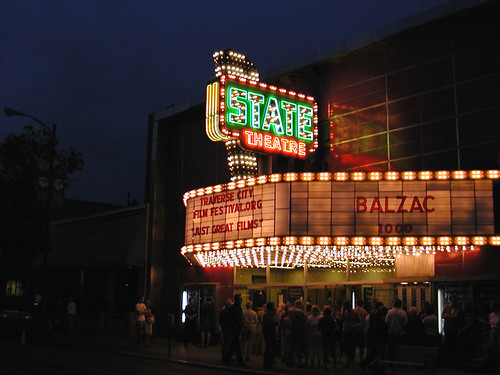
The notion that festivals could somehow share the revenue from ticket sales isn't completely without merit but it's a thorny problem. What if a festival increased its per-ticket price by a few dollars and promised to pass that "surplus" on to the filmmaker? The accounting would be nightmarish (and likely impossible in the case of short film programs), but the real question is: would filmmakers be incented to work even harder to fill their screenings, knowing that they stand to make a few hundred bucks on the deal? I have a hunch that the results would be mixed at best. Some filmmakers would kick ass to really make it work, others would operate about the same as they do now, and still others would find the rewards insufficient. After all, even with a medium-sized theater of 200 seats, you're only talking about making back the cost of a single plane ticket -- and that's if you pack the house.
I can tell you with near certainty that overall happiness at film festivals wouldn't be increased by this scheme. At any given festival there are always a tiny but vocal minority of filmmakers unhappy about the way they or their films are being treated. Introducing the almighty dollar into the equation could only make this situation more treacherous. Suddenly a smaller venue represents not just less prestige but also fewer seats to potentially sell. A less-than-desirable screening time or a perceived smaller share of the festival's marketing efforts would suddenly mean lost revenue in addition to smaller crowds. Festival programmers would be under pressure to take fewer risks, especially given that audiences likely wouldn't respond well to higher ticket prices. Given that the festival system works reasonably well now without the promise of remuneration, it's unlikely that even the most forward-thinking of fests would introduce such unwelcome complications and the potentially explosive situations that could result.
Some festivals do pay flat screening fees, though more often to the distributors of popular films that have already been acquired than directly to independent filmmakers. There is an entire class of festival that currently pays for a large portion of the feature films they screen: the gay & lesbian (aka the "GLIFFs" or GLBT) festivals. Demand for GLBT-interest films is high enough, and the material scarce enough, that most quality films in the category get snapped up by distributors quickly. Those distributors know that the target market isn't large enough to support a traditional theatrical run, but they can generally count on the festivals to pay a fee for the right to screen a popular festival film. 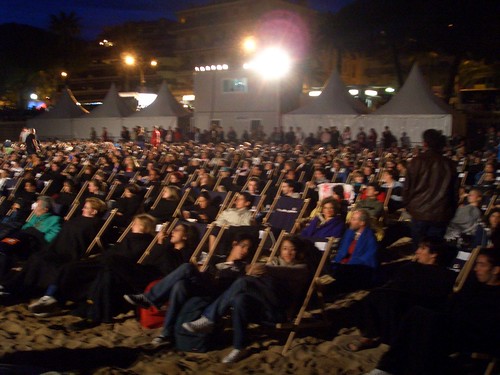
Such festivals are caught in a tough spot between what they can afford and what their audiences expect to see from other GLBT festivals. Lisa Kaselak, programming director for the Austin Gay & Lesbian Film Festival, admits that paying such fees makes her job more difficult, but as a working filmmaker she has seen the benefits of the system as well. "[Gay and lesbian] festivals across the U.S. are really struggling to pay the screening fees we have to pay. The margins are razor-thin and we often lose money on screenings. I can't blame distributors though, because they provide a valuable service." Don't expect this model to creep into the mainstream fests, however. Mainstream fests pay far fewer screening fees and some refuse to pay them at all. With a larger pool of fee-free films to choose from, they can well afford to do so.
With the notion that festivals are a potential source of revenue at least partially laid to rest, let's turn our attention to another implication of Marlow's essay that turns out not to be true:
Notion #3: There's money to be made in theatrical distribution. Filmmakers get starry-eyed at the thought of their flims playing metroplexes around the world, but when all is said and done even the major studios rarely make their money back after prints and advertising. Theatrical runs these days are basically promotional campaigns to sell DVD copies. There is a direct correlation between the number of people who see a film in the theaters and the eventual sales success of a film on DVD, but the revenue from the theatrical run itself is almost always negligible. (Harry Potter flicks and Spider-Man sequels aside.)
What does it mean for filmmakers? Well, if the festival circuit is the only "theatrical run" your film is likely to get, you'd better make the most of it. Gear up the marketing machine and pack those screenings, because the more people who see your film now, the more people who will buy it on DVD later. A more interesting idea buried in here is the thought that there is a direct correlation between the number of people who see your film (under any circumstances) and the number of people who will eventually buy it. This sounds obvious and simple, but some filmmakers behave as if exactly the opposite were true. They fret about piracy (you should be so lucky!), dither about putting their films online, and withhold screeners as if the discs were made of gold. If your film is that good viewers will pay for it -- but they have to know about it first. Try viewing every "free" screening of your film not as a sale you lost but as a marketing opportunity you gained.
I've written more about this elsewhere and expect to do so again, but it's a concept filmmakers need to wrap their heads around: hiding your light (or film) under a bushel for fear of "overplaying" it or tapping out a limited audience is old-school thinking. 
Notion #4: Most films that play festivals deserve wider audiences than they get after their festival run is over. This notion follows on the idea that if a film plays a festival it must be a good film. Anyone who has been to a few film festivals can tell you that simply isn't true -- there are plenty of sub-par films playing festivals, especially those whose directors rely solely on a few hundred submissions to program their entire event. You can't really fault festivals for playing the best from a limited pool of submissions, but it doesn't make them good films and it certainly doesn't make them candidates for widespread distribution. As a filmmaker, you need to be prepared to recognize that even though you made a movie and even though it played the festival circuit, it might not be good enough ever to pay for itself.
Even technically "good" films can fail to find distribution after their festival runs. In casual conversation at festivals you occasionally hear the phrase "I'd even recommend that film to my mom." It's a telling phrase: it implies that the majority of movies one sees at festivals aren't suitable for mom, and poor mom is the metaphorical stand-in for the mainstream moviegoing populace. There are those distributors whose mission is to support indie filmmakers, but reality often intrudes: selling a movie that people don't already know they want to see is hard, expensive work. Wouldn't it just be easier to sell the movies you'd recommend to your mom? I believe that there is a layer of indie films in between the top 5% that get distribution and the 90% of indie films that are mostly unwatchable. But there again, you're only talking about a thin slice of movies that get overlooked or need extra help to find the right audience. The vast majority of even festival-selected films -- quite likely yours included -- aren't going to get picked up.
Discouraging? Yes, but not quite cause for despair. Since the dawn of filmmaking, indie film has relied on an influx of cash from outside the system to survive. The filmmakers who eventually make it are the persistent ones. They continue to find sources for that outside cash (investors or day jobs or medical experiments) and continue to make movies until they create the picture that everyone wants to recommend to their mom. And who knows? Once you've done that, maybe you'll be able to sell your back catalog.
Just don't ask for a cut of the festival receipts.
Blue Glow: First evening with the Netflix Roku box
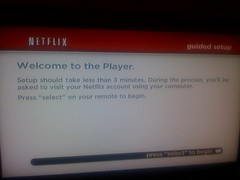 Over on my film & tech blog, Blue Glow, I posted my first impressions of the Netflix Roku box, which allows you to watch movies as streaming video directly to your television. Boxes like these will play a large part in how we watch movies in the coming years. Indie filmmakers would do well to pay attention to which ones are the most popular and how the rights-holders get paid. Given that only 10% of Netflix's DVD catalog are available on the Roku box, there's plenty of room for indies to be seen alongside the other content -- and competing with old episodes of Kojak should be somewhat easier than trying to be discovered opposite the latest Pixar release.
Over on my film & tech blog, Blue Glow, I posted my first impressions of the Netflix Roku box, which allows you to watch movies as streaming video directly to your television. Boxes like these will play a large part in how we watch movies in the coming years. Indie filmmakers would do well to pay attention to which ones are the most popular and how the rights-holders get paid. Given that only 10% of Netflix's DVD catalog are available on the Roku box, there's plenty of room for indies to be seen alongside the other content -- and competing with old episodes of Kojak should be somewhat easier than trying to be discovered opposite the latest Pixar release.
Read Blue Glow: First evening with the Netflix Roku box.
Marfa Film Festival video recap
I brought home a bunch of video from the Marfa Film Festival, and those more technically adept than I at B-Side edited it together into the first episode of "The Show by B-Side." There are already plans to cover more festivals and the filmmakers we encounter there. Stay tuned.



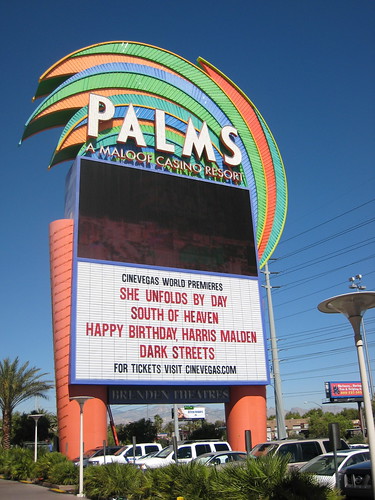

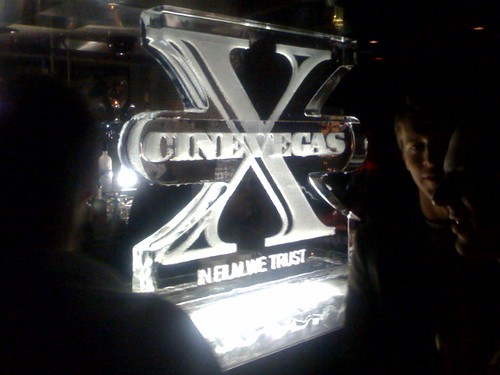
 Chris Holland has been writing about movies since 1991. In 1996 he co-founded
Chris Holland has been writing about movies since 1991. In 1996 he co-founded 